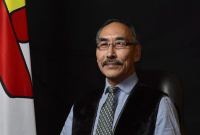With marijuana legalization only months away, members of Nunavut's new government are finally discussing how the territory will handle the change.
"We do feel behind in our preparation," said Dan Carlson, Nunavut's deputy minister of finance.
The territory had an election in the fall and, because of its consensus-style government, little could be done until new members met and laid out an agenda for the new legislature session — a meeting that doesn't begin until Monday.
"Bad timing," said Carlson.
But he said Nunavut's plans to regulate distribution and consumption of cannabis are emerging —and are likely to look a little different than anywhere else in the country. Don't look for pot stores in Iqaluit any time soon, he said.
"We are only proposing to offer online sales. We think that's the smart move for Nunavut."
The territory is considering whether to partner with private-sector vendors who would sell cannabis on the government's behalf.
"The government would retain control and we would essentially contract out one or more organizations to deliver certain aspects of our operations," Carlson said.
"We're deciding product. We're deciding price. We're just working with the private sector."
Marijuana legalization appears to be popular in Nunavut. A government poll last fall found three-quarters of respondents favoured the move. Sizable minorities said it should be unrestricted in public places. Most favoured a minimum age of 19.
"Marijuana has been smoked and consumed in Nunavut for many years," said Iqaluit Mayor Madeleine Redfern, who is also head of the Nunavut Association of Municipalities.
She doesn't anticipate a rash of new social problems. The recent opening of Nunavut's first beer and wine store in her city wasn't followed by increased crime, she said.
But applying the pot law could create problems. Nunavut communities depend on bylaw officers to enforce laws such as those around impaired driving, and extending those responsibilities to include marijuana may create the need for more training.
Communities also want to have some control over where cannabis is used, said Redfern.
"The main concern is ensuring the municipalities are going to get the support we need to amend the bylaws and there is some ability for municipalities to regulate and control. If there is training that is offered to the RCMP, it should be made available to local bylaw officers."
Nunavut mayors have also been renewing their call for better substance abuse treatment facilities in the territory. Nunavut has no residential treatment centre.
Nunavut currently allows communities to decide if they will allow alcohol sales, but that is unlikely to survive cannabis legalization, said Carlson.
"At this stage, we're proposing no. We appreciate for some communities this is a sensitive position for the government to take and we're hearing about it."
Carlson suggested a municipal ban on smoking cannabis would likely have little effect pointing to decades of federal prohibition.
Despite Nunavut's slow start, the territory should be ready for the federal law. A bill should be introduced into the territorial legislature in May or June, he said.
"We are not going to be jumping into a fully mature system, but we don't need to. We're expecting a lot of evolution, a lot of change in the industry.
"In terms of the actual operations, we do feel it is possible to have an online system up and running this summer."






Comments